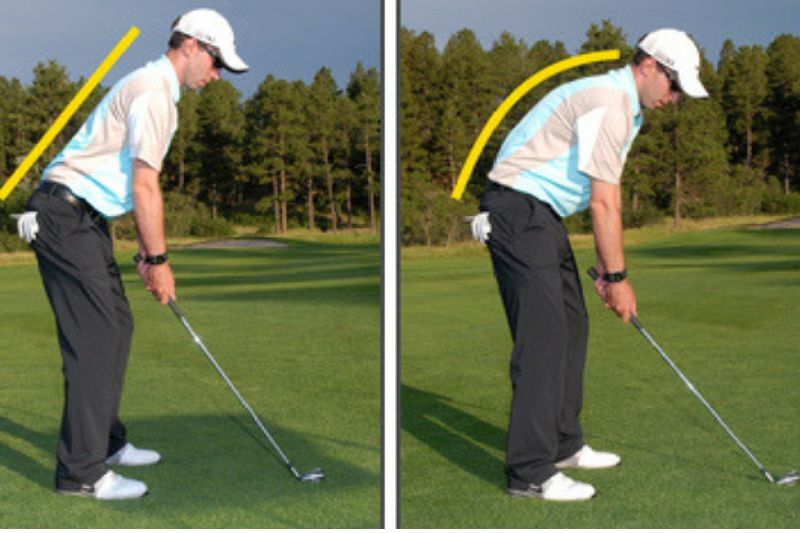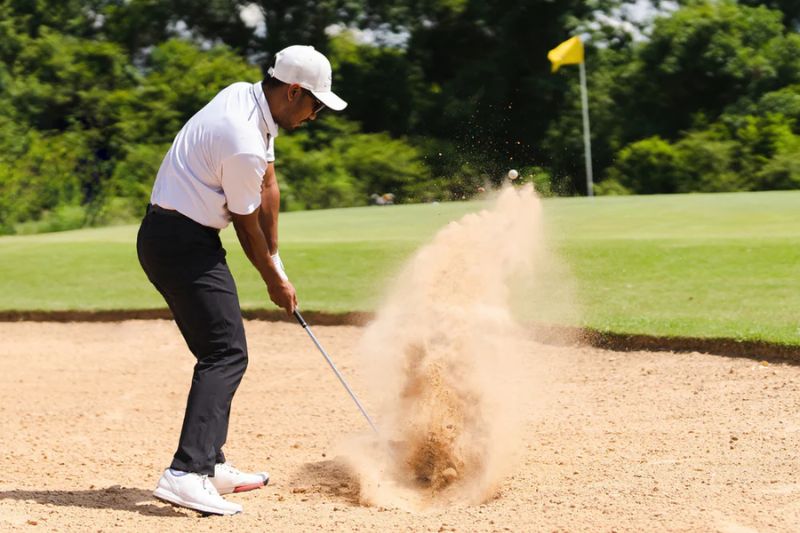Golf is a sport that can be both exhilarating and frustrating, especially for beginners. As someone who has navigated the learning curve of golf, I can tell you that the journey is filled with ups and downs. However, with the right tips and mindset, you can make significant progress while enjoying the game. Below, I’ll share essential golf tips for beginners that will help you build a solid foundation.
Golf tips for beginner

Understanding the Basics of Golf
Golf is more than just hitting a ball with a club; it’s about strategy, skill, and a bit of patience. Here are some fundamental aspects to grasp as you start your golfing journey.
The Golf Course Layout
Understanding the layout of a golf course is crucial. Most courses consist of 18 holes, each designed with various challenges, including hazards like bunkers and water. Familiarize yourself with terms like “par,” which indicates the number of strokes a skilled golfer is expected to take to complete a hole.
Essential Golf Equipment
Before stepping onto the course, you’ll need some basic equipment:
- Clubs: Start with a half set that includes a driver, a couple of irons, and a putter.
- Golf Balls: Choose a ball that suits your playing style. Beginners often benefit from softer balls that provide more distance and forgiveness.
- Tees: These help elevate the ball for the initial shot on each hole.
- Golf Shoes: Proper footwear will provide stability and support during your swing.
The Importance of a Good Grip
Your grip is the first point of contact with the club, making it one of the most crucial aspects of your swing. A proper grip can significantly impact your shot accuracy. Here’s a simple guide to mastering your grip:
- Placement: Hold the club with your left hand (for right-handed golfers) so that the club rests diagonally across your fingers.
- Pressure: Grip the club firmly but not too tight. Imagine holding a tube of toothpaste without squeezing any out.
- Alignment: Your thumb should point down the shaft of the club, allowing for better control.
For a visual guide, check out this image on grip techniques.
Developing Your Swing
Your swing is the heart of your game. Here are some tips to help you develop a consistent and effective swing.
Posture and Alignment
Good posture is essential for a successful swing. Here’s how to set up:
- Stand with your feet shoulder-width apart.
- Bend slightly at the hips while keeping your back straight.
- Position the ball in line with your left foot (for right-handed golfers).
The Swing Mechanics
Understanding the mechanics of your swing can help you hit the ball more effectively:
- Takeaway: Start your swing by moving the club back smoothly, keeping it low to the ground.
- Backswing: Rotate your shoulders and hips while lifting the club to shoulder height.
- Downswing: Shift your weight to your front foot and bring the club down in a smooth motion.
- Follow-through: Finish your swing with your club high and your body facing the target.
For a visual representation of swing mechanics, refer to this image.
Short Game Techniques
The short game is where many strokes can be saved. Here are some tips to improve your chipping and putting.
Chipping Tips
Chipping is about precision and touch. Here’s how to improve your chip shots:
- Stance: Keep your feet close together and your weight on your front foot.
- Swing: Use a pendulum motion with your arms while keeping your wrists firm.
- Aim: Focus on landing the ball on the green and letting it roll toward the hole.
Putting Tips
Putting can make or break your score. Here’s how to enhance your putting skills:
- Grip: Use a light grip and keep your hands steady.
- Stance: Stand with your feet shoulder-width apart and align your body with the target.
- Stroke: Make a smooth, controlled stroke, focusing on the ball and not the hole.
For more on putting techniques, view this image.
Practice Makes Perfect
Regular practice is key to improvement. Here’s how to structure your practice sessions:
Driving Range Drills
Spend time at the driving range working on your full swing. Focus on:
- Consistency: Hit the same club multiple times to develop a feel for distance.
- Feedback: Use alignment sticks to ensure your stance and swing path are correct.
Short Game Practice
Dedicate time to your short game by practicing:
- Chipping: Set up targets at various distances and practice landing the ball on the green.
- Putting: Work on different lengths of putts and practice reading the greens.
Playing Your First Round
When you’re ready to hit the course, here are some tips for your first round:
Play with Experienced Golfers

Playing with more experienced golfers can provide valuable insights. They can offer tips on course management and strategy.
Focus on Enjoyment
Remember, golf is meant to be fun! Don’t get too caught up in your score. Focus on making solid shots and enjoying the experience.
Learn Course Etiquette
Understanding golf etiquette is essential. Here are some basic rules:
- Be Quiet: Stay silent while others are taking their shots.
- Repair the Course: Fix any divots or ball marks you create.
- Keep Pace: Be ready to take your shot when it’s your turn.
Setting Realistic Goals
As a beginner, it’s important to set achievable goals. Focus on:
- Improving Your Skills: Aim to improve specific aspects of your game, like your short game or putting.
- Enjoying the Process: Celebrate small victories, whether it’s hitting a great shot or making a putt.
Staying Mentally Strong
Golf is as much a mental game as it is physical. Here are tips to maintain a positive mindset:
- Stay Patient: Progress takes time. Don’t get discouraged by bad shots.
- Visualize Success: Before each shot, visualize the ball landing where you want it to go.
- Breathe: Take deep breaths to calm your nerves, especially before important shots.
Some notes when learning to play golf for beginners

Here are some helpful notes for beginners learning to play golf:
Start with the Basics
Learn the Rules: Familiarize yourself with basic golf rules and etiquette. Understanding the game’s structure and proper behavior on the course will help you feel more confident.
Get the Right Gear: Invest in a basic set of clubs suited to beginners. A driver, a few irons (such as 7, 9), a putter, and a sand wedge are a good starting point. Consider getting clubs fitted for your height and swing style.
Work on Your Grip
Find the Right Grip: Experiment with different grips (interlocking, overlapping, or ten-finger) to see which feels most comfortable. A proper grip helps control the club and improve accuracy.
Keep it Relaxed: Avoid gripping the club too tightly. A relaxed grip allows for a smoother swing and better control.
Master the Stance and Posture
Proper Alignment: Stand with your feet shoulder-width apart, and align your body parallel to your target line. This helps with accuracy and balance.
Maintain Balance: Keep your weight evenly distributed between both feet and ensure your posture is athletic, with a slight bend in your knees and hips.
Focus on the Swing
Smooth Swing: Work on making a smooth, controlled swing rather than trying to hit the ball hard. A steady rhythm will improve consistency and accuracy.
Follow Through: Ensure a complete follow-through in your swing to maximize distance and control.
Practice the Short Game
Putting Skills: Practice putting regularly. Focus on your grip, stance, and reading the green. Developing a good putting technique can significantly lower your score.
Chipping and Pitching: Learn how to chip and pitch effectively around the greens. Use proper technique and practice with different clubs to handle various lies and distances.
Manage Your Course Play

Play Strategically: Avoid risky shots and play within your skill level. Aim for the center of the greens and avoid hazards.
Course Awareness: Understand the layout of the course and adapt your strategy accordingly. Knowing where to place your shots can make a big difference.
Stay Physically and Mentally Prepared
Warm Up: Always warm up before your round or practice session. Stretching and light exercises can prevent injuries and improve performance.
Mental Focus: Golf is as much a mental game as it is physical. Stay focused, be patient, and manage your expectations. Don’t let frustration affect your game.
Seek Guidance and Feedback
Professional Lessons: Consider taking lessons from a qualified golf instructor. They can provide valuable feedback and help you develop good habits from the start.
Watch and Learn: Observe experienced golfers and instructional videos. Learning from others can offer insights and improve your technique.
Practice Regularly
Consistency is Key: Regular practice is essential to improvement. Set aside time for both range practice and on-course play.
Track Progress: Keep a log of your practice sessions and rounds. Track your progress and identify areas for improvement.
Enjoy the Game
Have Fun: Golf is meant to be enjoyable. Celebrate small victories, appreciate the time spent outdoors, and enjoy the social aspects of the game.
Conclusion
Starting your golf journey can be daunting, but with the right tips and a positive attitude, you can enjoy the game and improve your skills. Remember to practice regularly, focus on the fundamentals, and most importantly, have fun out there!
FAQs
- How often should beginners practice golf?
Aim for at least two practice sessions per week, focusing on different aspects of your game.
- What equipment do I need as a beginner?
Start with a basic set of clubs, a few golf balls, tees, and proper footwear.
- Should I take lessons as a beginner?
Yes, taking a few lessons can help you develop good habits and improve faster.
- How can I improve my putting?
Practice regularly, focus on your grip and stance, and work on reading the greens.
- What should I focus on during my first round?
Enjoy the experience, focus on making solid shots, and learn from more experienced players.

I am the owner of Ricks Golf Shop, a popular destination for golf enthusiasts. My passion for golf began in my teenage years and has only grown over the years. With over 10 years of experience in the golf industry, I offer expert advice and quality products. With a friendly demeanor and extensive knowledge, I ensure every customer leaves happy.
